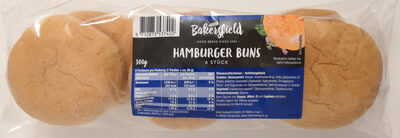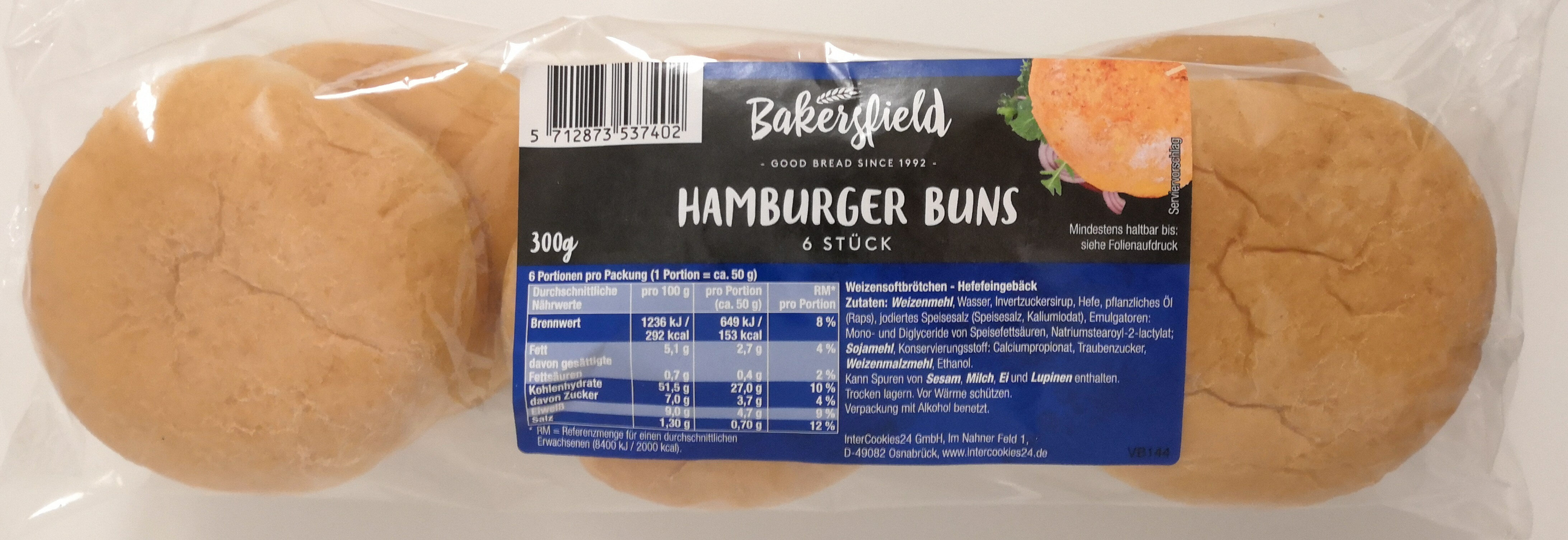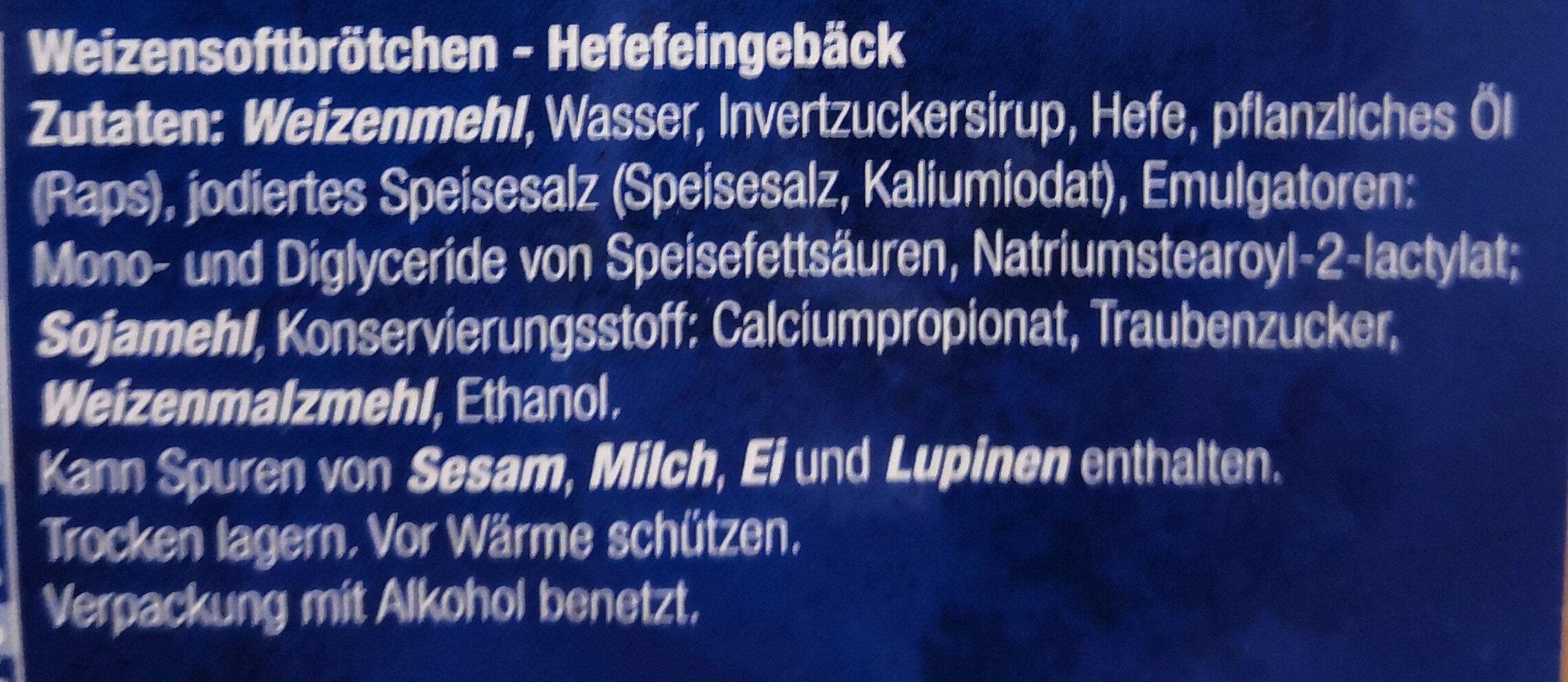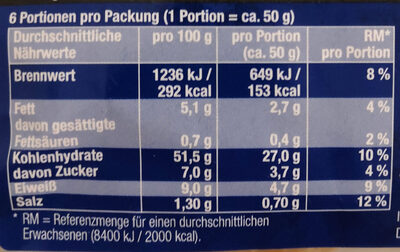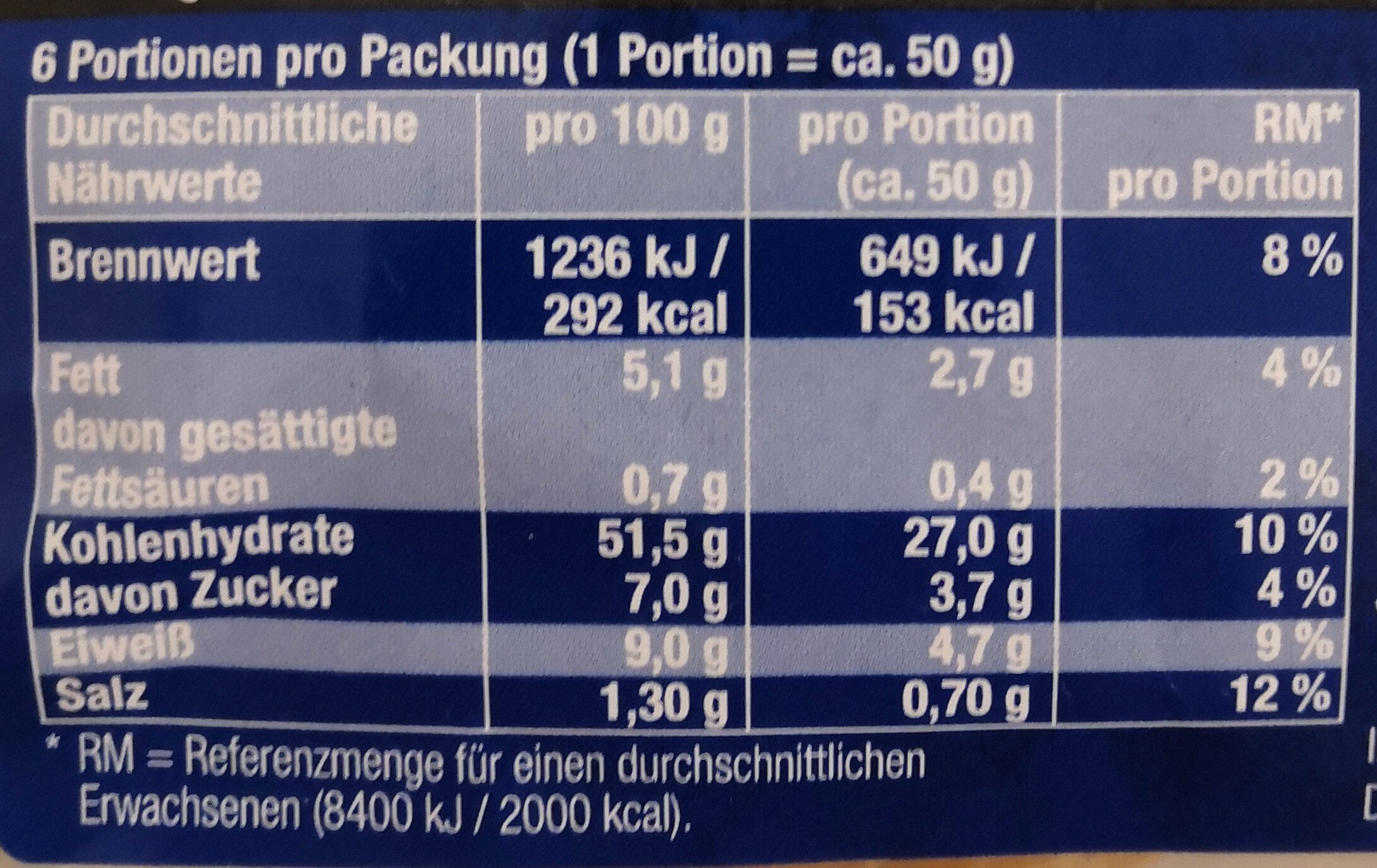Help us make food transparency the norm!
As a non-profit organization, we depend on your donations to continue informing consumers around the world about what they eat.
The food revolution starts with you!
Hamburger Buns - Bakersfield - 6 x 50 g = 300 g
Hamburger Buns - Bakersfield - 6 x 50 g = 300 g
This product page is not complete. You can help to complete it by editing it and adding more data from the photos we have, or by taking more photos using the app for Android or iPhone/iPad. Thank you!
×
Barcode: 5712873537402 (EAN / EAN-13)
Quantity: 6 x 50 g = 300 g
Packaging: Plastic
Brands: Bakersfield, InterCookies24
Categories: Plant-based foods and beverages, Plant-based foods, Cereals and potatoes, Breads, Special breads, Hamburger buns, Buns
Origin of ingredients: Germany
Manufacturing or processing places: Osnabrück, Deutschland
Link to the product page on the official site of the producer: http://www.intercookies24.de
Stores: NETTO
Countries where sold: Germany
Matching with your preferences
Health
Ingredients
-
21 ingredients
: Weizenmehl, Wasser, Invertzuckersirup, Hefe, pflanzliches Öl (Raps), jodiertes Speisesalz (Speisesalz, Kaliumiodat), Emulgatoren: Mono - und Diglyceride von Speisefettsäuren, Natriumstearoyl-2-lactylat; Sojamehl, Konservierungsstoff: Calciumpropionat, Traubenzucker, Weizenmalzmehl, Ethanol. Kann Spuren von Sesam, Milch, Ei und Lupinen enthalten. Trocken lagern. Vor Wärme schützen. Verpackung mit Alkohol benetzt.Allergens: Gluten, SoybeansTraces: Eggs, Lupin, Milk, Sesame seeds, de:alkohol
Food processing
-
Ultra processed foods
Elements that indicate the product is in the 4 - Ultra processed food and drink products group:
- Additive: E471 - Mono- and diglycerides of fatty acids
- Additive: E481 - Sodium stearoyl-2-lactylate
- Ingredient: Emulsifier
- Ingredient: Invert sugar
Food products are classified into 4 groups according to their degree of processing:
- Unprocessed or minimally processed foods
- Processed culinary ingredients
- Processed foods
- Ultra processed foods
The determination of the group is based on the category of the product and on the ingredients it contains.
Additives
-
E1510 - Ethanol
Ethanol: Ethanol, also called alcohol, ethyl alcohol, grain alcohol, and drinking alcohol, is a chemical compound, a simple alcohol with the chemical formula C2H5OH. Its formula can be also written as CH3−CH2−OH or C2H5−OH -an ethyl group linked to a hydroxyl group-, and is often abbreviated as EtOH. Ethanol is a volatile, flammable, colorless liquid with a slight characteristic odor. It is a psychoactive substance and is the principal type of alcohol found in alcoholic drinks. Ethanol is naturally produced by the fermentation of sugars by yeasts or via petrochemical processes, and is most commonly consumed as a popular recreational drug. It also has medical applications as an antiseptic and disinfectant. The compound is widely used as a chemical solvent, either for scientific chemical testing or in synthesis of other organic compounds, and is a vital substance used across many different kinds of manufacturing industries. Ethanol is also used as a clean-burning fuel source.Source: Wikipedia
-
E282 - Calcium propionate
Calcium propanoate: Calcium propanoate or calcium propionate has the formula Ca-C2H5COO-2. It is the calcium salt of propanoic acid.Source: Wikipedia
-
E471 - Mono- and diglycerides of fatty acids
Mono- and diglycerides of fatty acids (E471), are food additives commonly used as emulsifiers in various processed foods.
These compounds consist of glycerol molecules linked to one or two fatty acid chains, which help stabilize and blend water and oil-based ingredients. E471 enhances the texture and shelf life of products like margarine, baked goods, and ice cream, ensuring a smooth and consistent texture.
It is generally considered safe for consumption within established regulatory limits.
-
E481 - Sodium stearoyl-2-lactylate
Sodium stearoyl lactylate: Sodium stearoyl-2-lactylate -sodium stearoyl lactylate or SSL- is a versatile, FDA approved food additive used to improve the mix tolerance and volume of processed foods. It is one type of a commercially available lactylate. SSL is non-toxic, biodegradable, and typically manufactured using biorenewable feedstocks. Because SSL is a safe and highly effective food additive, it is used in a wide variety of products ranging from baked goods and desserts to pet foods.As described by the Food Chemicals Codex 7th edition, SSL is a cream-colored powder or brittle solid. SSL is currently manufactured by the esterification of stearic acid with lactic acid and partially neutralized with either food-grade soda ash -sodium carbonate- or caustic soda -concentrated sodium hydroxide-. Commercial grade SSL is a mixture of sodium salts of stearoyl lactylic acids and minor proportions of other sodium salts of related acids. The HLB for SSL is 10-12. SSL is slightly hygroscopic, soluble in ethanol and in hot oil or fat, and dispersible in warm water. These properties are the reason that SSL is an excellent emulsifier for fat-in-water emulsions and can also function as a humectant.Source: Wikipedia
Ingredients analysis
-
May contain palm oil
Ingredients that may contain palm oil: E471, E481
-
Vegan status unknown
Unrecognized ingredients: Grape sugar, de:trocken-lagern, de:vor-wärme-schützen, de:verpackung-mit-alkohol-benetztSome ingredients could not be recognized.
We need your help!
You can help us recognize more ingredients and better analyze the list of ingredients for this product and others:
- Edit this product page to correct spelling mistakes in the ingredients list, and/or to remove ingredients in other languages and sentences that are not related to the ingredients.
- Add new entries, synonyms or translations to our multilingual lists of ingredients, ingredient processing methods, and labels.
If you would like to help, join the #ingredients channel on our Slack discussion space and/or learn about ingredients analysis on our wiki. Thank you!
-
Vegetarian status unknown
Unrecognized ingredients: Grape sugar, de:trocken-lagern, de:vor-wärme-schützen, de:verpackung-mit-alkohol-benetztSome ingredients could not be recognized.
We need your help!
You can help us recognize more ingredients and better analyze the list of ingredients for this product and others:
- Edit this product page to correct spelling mistakes in the ingredients list, and/or to remove ingredients in other languages and sentences that are not related to the ingredients.
- Add new entries, synonyms or translations to our multilingual lists of ingredients, ingredient processing methods, and labels.
If you would like to help, join the #ingredients channel on our Slack discussion space and/or learn about ingredients analysis on our wiki. Thank you!
-
Details of the analysis of the ingredients
We need your help!
Some ingredients could not be recognized.
We need your help!
You can help us recognize more ingredients and better analyze the list of ingredients for this product and others:
- Edit this product page to correct spelling mistakes in the ingredients list, and/or to remove ingredients in other languages and sentences that are not related to the ingredients.
- Add new entries, synonyms or translations to our multilingual lists of ingredients, ingredient processing methods, and labels.
If you would like to help, join the #ingredients channel on our Slack discussion space and/or learn about ingredients analysis on our wiki. Thank you!
: Weizenmehl, Wasser, Invertzuckersirup, Hefe, pflanzliches Öl (Raps), jodiertes Speisesalz (Speisesalz, Kaliumiodat), Emulgatoren (mono- und Diglyceride von Speisefettsäuren), Natriumstearoyl-2-lactylat, Sojamehl, Konservierungsstoff (Calciumpropionat), Traubenzucker, Weizenmalzmehl, Ethanol, Trocken lagern, Vor Wärme schützen, Verpackung mit Alkohol benetzt- Weizenmehl -> en:wheat-flour - vegan: yes - vegetarian: yes - ciqual_proxy_food_code: 9410 - percent_min: 6.25 - percent_max: 100
- Wasser -> en:water - vegan: yes - vegetarian: yes - ciqual_food_code: 18066 - percent_min: 0 - percent_max: 50
- Invertzuckersirup -> en:invert-sugar-syrup - vegan: yes - vegetarian: yes - percent_min: 0 - percent_max: 33.3333333333333
- Hefe -> en:yeast - vegan: yes - vegetarian: yes - percent_min: 0 - percent_max: 25
- pflanzliches Öl -> en:vegetable-oil - vegan: yes - vegetarian: yes - from_palm_oil: maybe - percent_min: 0 - percent_max: 20
- Raps -> en:rapeseed - vegan: yes - vegetarian: yes - percent_min: 0 - percent_max: 20
- jodiertes Speisesalz -> en:iodised-salt - vegan: yes - vegetarian: yes - ciqual_food_code: 11058 - percent_min: 0 - percent_max: 1.3
- Speisesalz -> en:salt - vegan: yes - vegetarian: yes - ciqual_food_code: 11058 - percent_min: 0 - percent_max: 1.3
- Kaliumiodat -> en:e917 - vegan: yes - vegetarian: yes - percent_min: 0 - percent_max: 0.65
- Emulgatoren -> en:emulsifier - percent_min: 0 - percent_max: 1.3
- mono- und Diglyceride von Speisefettsäuren -> en:e471 - vegan: maybe - vegetarian: maybe - from_palm_oil: maybe - percent_min: 0 - percent_max: 1.3
- Natriumstearoyl-2-lactylat -> en:e481 - vegan: maybe - vegetarian: maybe - from_palm_oil: maybe - percent_min: 0 - percent_max: 1.3
- Sojamehl -> en:soya-flour - vegan: yes - vegetarian: yes - ciqual_food_code: 20900 - percent_min: 0 - percent_max: 1.3
- Konservierungsstoff -> en:preservative - percent_min: 0 - percent_max: 1.3
- Calciumpropionat -> en:e282 - vegan: yes - vegetarian: yes - percent_min: 0 - percent_max: 1.3
- Traubenzucker -> en:grape-sugar - percent_min: 0 - percent_max: 1.3
- Weizenmalzmehl -> en:malted-wheat-flour - vegan: yes - vegetarian: yes - ciqual_proxy_food_code: 9410 - percent_min: 0 - percent_max: 1.3
- Ethanol -> en:e1510 - vegan: yes - vegetarian: yes - percent_min: 0 - percent_max: 1.3
- Trocken lagern -> de:trocken-lagern - percent_min: 0 - percent_max: 1.3
- Vor Wärme schützen -> de:vor-wärme-schützen - percent_min: 0 - percent_max: 1.3
- Verpackung mit Alkohol benetzt -> de:verpackung-mit-alkohol-benetzt - percent_min: 0 - percent_max: 1.3
Nutrition
-
Missing data to compute the Nutri-Score
Missing nutrition facts
⚠ ️The nutrition facts of the product must be specified in order to compute the Nutri-Score.Could you add the information needed to compute the Nutri-Score? Add nutrition facts
-
Nutrient levels
-
Fat in moderate quantity (5.1%)
What you need to know- A high consumption of fat, especially saturated fats, can raise cholesterol, which increases the risk of heart diseases.
Recommendation: Limit the consumption of fat and saturated fat- Choose products with lower fat and saturated fat content.
-
Sugars in moderate quantity (7%)
What you need to know- A high consumption of sugar can cause weight gain and tooth decay. It also augments the risk of type 2 diabetes and cardio-vascular diseases.
Recommendation: Limit the consumption of sugar and sugary drinks- Sugary drinks (such as sodas, fruit beverages, and fruit juices and nectars) should be limited as much as possible (no more than 1 glass a day).
- Choose products with lower sugar content and reduce the consumption of products with added sugars.
-
Salt in moderate quantity (1.3%)
What you need to know- A high consumption of salt (or sodium) can cause raised blood pressure, which can increase the risk of heart disease and stroke.
- Many people who have high blood pressure do not know it, as there are often no symptoms.
- Most people consume too much salt (on average 9 to 12 grams per day), around twice the recommended maximum level of intake.
Recommendation: Limit the consumption of salt and salted food- Reduce the quantity of salt used when cooking, and don't salt again at the table.
- Limit the consumption of salty snacks and choose products with lower salt content.
-
-
Nutrition facts
Nutrition facts As sold
for 100 g / 100 mlAs sold
per serving (50g)Compared to: Buns Fat 5.1 g 2.55 g +19% Saturated fat ? ? Carbohydrates 51.5 g 25.8 g +11% Sugars 7 g 3.5 g +54% Fiber ? ? Proteins 9 g 4.5 g -0% Salt 1.3 g 0.65 g +17% Fruits‚ vegetables‚ nuts and rapeseed‚ walnut and olive oils (estimate from ingredients list analysis) 2.93 % 2.93 %
Environment
-
Eco-Score B - Low environmental impact
⚠ ️Select a country in order to include the full impact of transportation.The Eco-Score is an experimental score that summarizes the environmental impacts of food products.→ The Eco-Score was initially developped for France and it is being extended to other European countries. The Eco-Score formula is subject to change as it is regularly improved to make it more precise and better suited to each country.Life cycle analysis
-
Average impact of products of the same category: A (Score: 88/100)
Category: Rolls for hamburger/hotdog (buns), prepacked
Category: Rolls for hamburger/hotdog (buns), prepacked
- PEF environmental score: 0.21 (the lower the score, the lower the impact)
- including impact on climate change: 1.70 kg CO2 eq/kg of product
Stage Impact Agriculture
77.1 %Processing
17.1 %Packaging
0.6 %Transportation
4.9 %Distribution
0.4 %Consumption
0.0 %
Bonuses and maluses
-
Origins of ingredients with a medium impact
Bonus: +4
Environmental policy: +4
Transportation: 0
Origin of the product and/or its ingredients % of ingredients Impact Germany 100 %Medium
-
Packaging with a medium impact
Malus: -10
Shape Material Recycling Impact Unknown Plastic High ⚠ ️ The information about the packaging of this product is not sufficiently precise (exact shapes and materials of all components of the packaging).⚠ ️ For a more precise calculation of the Eco-Score, you can modify the product page and add them.
If you are the manufacturer of this product, you can send us the information with our free platform for producers.
Eco-Score for this product
-
Impact for this product: B (Score: 79/100)
Product: Hamburger Buns - Bakersfield - 6 x 50 g = 300 g
Life cycle analysis score: 88
Sum of bonuses and maluses: -6
Final score: 79/100 (The score of products with non-recyclable and non-biodegradable packaging materials is capped at 79 (grade B).)
-
Carbon footprint
-
Equal to driving 0.9 km in a petrol car
170 g CO² per 100g of product
The carbon emission figure comes from ADEME's Agribalyse database, for the category: Rolls for hamburger/hotdog (buns), prepacked (Source: ADEME Agribalyse Database)
Stage Impact Agriculture
80.8 %Processing
10.9 %Packaging
0.4 %Transportation
7.6 %Distribution
0.3 %Consumption
0.0 %
Packaging
-
Packaging with a medium impact
-
Packaging parts
(Plastic)
-
Packaging materials
Material % Packaging weight Packaging weight per 100 g of product Plastic
-
Transportation
-
Origins of ingredients
Origins of ingredients with a medium impact
Origin of the product and/or its ingredients % of ingredients Impact Germany 100 %Medium
Report a problem
-
Incomplete or incorrect information?
Category, labels, ingredients, allergens, nutritional information, photos etc.
If the information does not match the information on the packaging, please complete or correct it. Open Food Facts is a collaborative database, and every contribution is useful for all.
Data sources
Product added on by predatorix
Last edit of product page on by ecoscore-impact-estimator.
Product page also edited by openfoodfacts-contributors, packbot.
